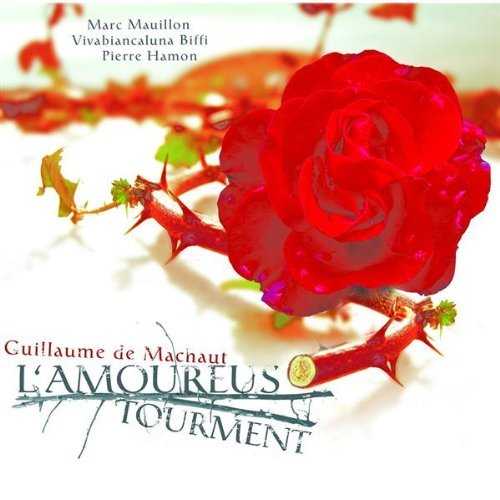
Performer: Vivabiancaluna Biffi, Marc Mauillon, Pierre Hamon
Composer: Guillame de Machaut, Jehan de Lescurel
Audio CD
SPARS Code: DDD
Number of Discs: 1
Format: FLAC (image+cue)
Label: Eloquentia
Size: 298 MB
Recovery: +3%
Scan: yes
01. Loyauté que point ne delay
02. De cuer je soupire
03. Lai de la Pastourelle
04. Comment que, pour l’éloignance
05. Ay mi!
Love? or the Ideal of Love?
There’s a lot of ‘musicianship’ in this recording, and a plausible level of musicology behind it, and yet I don’t find the lovely subjective sense of ‘authenticity’ that I crave from a performance of 14th C poetry in music. Guillaume Machaut (1300-1377) has been described as “the last great poet who was also an composer,” a categorization that implicitly ranks the poetry before the music. In our times, however, the music has earned more appreciation than the poetry, which is ineluctably devoted to chivalric Love. Machaut’s longest poems – his “lais’ – were not all supplied with music in the manuscripts that the poet assiduously prepared for posterity; a few were set both as polyphony and monody, but it was monodic recitation, supported perhaps by an improvising instrument, that must have been the commonest mode of performance of these poetic artifices.
This CD features such a musical recitation of Machaut’s “Loyate que point ne delay” – a `lai’ of twenty-some stanzas lamenting an unrequited love. It’s sung expressively by high baritone Marc Mauillion, with accompaniment on vielle by Vivabiancaluna Biffi and obbligato-like elaborations on transverse flute arranged and played by Pierre Hamon, the director of this ensemble. It’s a complete rendition fo the lai, thirty-six minutes long, and the poetic text is included in the notes in Machaut’s 14th C French, modern French, and English. So far, so good! If the lais are to be performed, they should be done with such respect for the poetry. The smaller half of this recording features a virelai by Machaut of three minutes, with voice and double flute; a ballade by Jehan de Lescurel with voice, vielle and hand drum, also three minutes; and two anonymous lais, the longer of them elaborately accompanied by vielle, drum, flute, and bagpipe.
“Authenticity’ is a vexing question in performance of Machaut and of any 14th C repertoire. To claim that we know how such music sounded would be silly; we don’t know what vocal timbres were preferred, what ensembles of instruments were probable or even imaginable, what level of technical artistry was expected of musicians. Pierre Hamon’s guesses are as good as anyone’s, and his involvement with this repertoire certainly makes his subjectivity more plausible than mine. Nevertheless, I `hear’ an aesthetic conflict in this performance, between the constrained artifice of Machaut’s poetry/music and the folkloric freedom of Hamon’s arrangements. What I know of Machaut’s life and times, what I see in the illuminations of his manuscripts, in the clothes he wore and the artifacts that surrounded his days, in the insistence of his poetry on polished form and rhetoric over any sort of personalization or individualism, all suggest to me that `artifice’ was his dominant aesthetic goal: perfection of diction that must have been matched by the strictest perfection of musical delivery, an art of the ideal elevated beyond anything temporal.
Pierre Hamon has heard a lustier, more human Machaut, and I strongly suspect that more listeners will be relieved by his decisions to bring this music down a little from its demesne of courtly artificiality. He’s deliberately inserted some of the `market fair’ into Machaut’s chivalric idealism, with his bagpipes and drums and his saltarello-like flute improvisations. Much of what we “know” about instruments and instrumental ensembles in Machaut’s France comes from iconography – manuscript illuminations especially – and none of it suggests a very prominent role for the transverse flute. Even ignoring that sort of historical authenticity, however, I find the flute accompaniments in this performance slightly overdone, verging on mere `noodling’ in parts, disconnected from the melodic modes and from the affect of the texts. That might sound like a minor objection, and it probably is, but it distracts me from enjoyment of the total performance.
There are lamentably few recordings of this repertoire that even approach the quality of this one. The only worthy comparison I can suggest would be the performance of lais and complaintes from Machaut’s “Reméde de Fortune” by countertenor Michael Collver with Ensemble Project Ars Nova (PAN). That performance, to my ears, comes closer to the Ideal.
many thanx